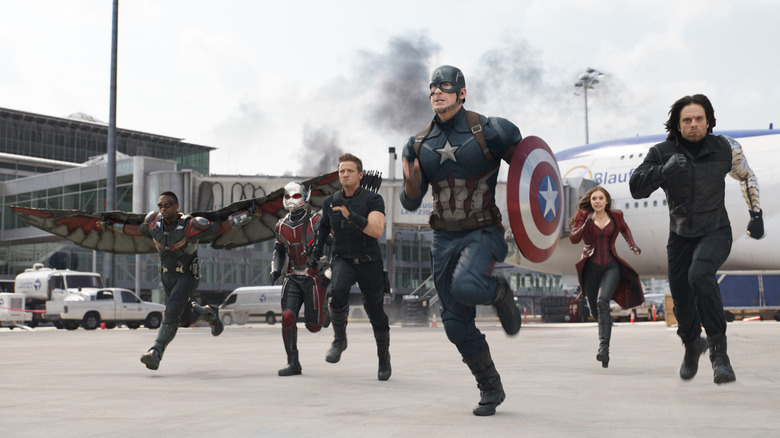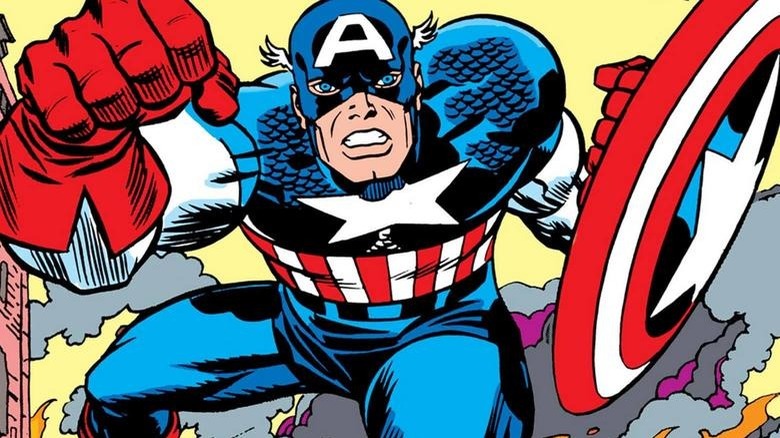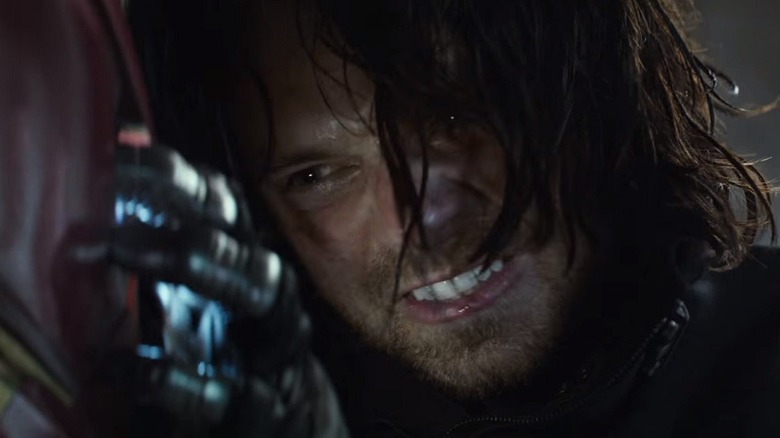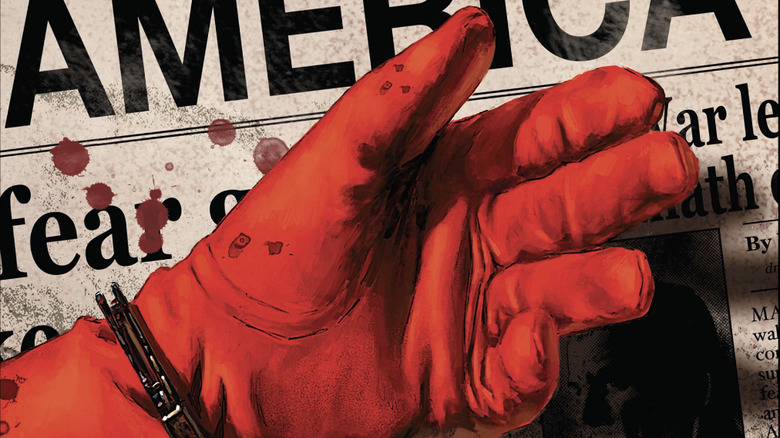Kevin Feige Rejected The Original Storyline For Captain America 3 Because It Wasn't 'Big Enough'
It's been known since 2016 that the third "Captain America" movie wasn't always going to be "Civil War." For one, Robert Downey Jr.'s involvement took some negotiation and you can't have "Civil War" without Iron Man. Second, the original plot was totally different.
As /Film reported at that time, the initial threequel premise centered around the "Madbomb." What is that, you might ask? In the Marvel Universe, it's a device that, through sonic waves, can drive whole crowds into frenzied violence. The device debuted in 1975; the eponymous "Madbomb" storyline ran in "Captain America" #193 to #200, written and drawn by original Cap co-creator Jack Kirby. Nate Moore, a producer on "Captain America: The Winter Soldier" and "Civil War," aptly compared the Madbomb to the rage-inducing SIM cards in "Kingsman: The Secret Service."
"Cap 3: Madbomb" still would have featured the return of Bucky Barnes (Sebastian Stan) and Baron Zemo (Daniel Bruhl) as the villain. Indeed, the Madbomb would have been the work of Zemo. So why did the movie widen scope? Moore, who appeared on "The Town with Matthew Belloni," has the answers. He came on the podcast in light of his most recent Marvel Studios production, "Black Panther: Wakanda Forever." However, he shed some light on the "Civil War" development process, including how it became "Civil War."
The Madbomb
According to Moore, it was Kevin Feige who suggested doing "Civil War," while Moore resisted. Moore felt that doing "Civil War" would crowd their already full plate and there's no way the film could fit in everything from the comic: "we don't have the New Warriors... we don't have the Negative Zone prison..."
Even after rereading "Civil War" at Feige's request, Moore still tried to sway him to do their original "grounded" and "political" storyline instead. However, the Marvel Studios' head honcho felt the Madbomb simply wasn't a big enough idea to captivate audiences, and so eventually put his foot down.
"I went to the writer's room with Markus, McFeely, and Joe, and Anthony, and Kevin peeked his head in and he goes, 'So, stop with the Madbomb, you guys are doing Civil War.' And I was like, 'Ah, f***.' And Joe was like, 'Yes! Civil War? Awesome!' And then we had to figure out how to do 'Civil War.' But he was like, 'There wasn't a big enough idea that would get audiences excited and we did it.'"
Cost of escalation
Moore, for one, thinks everything worked out for the best:
"Look, it was scary and when you're throwing out a whole thing and starting new, it's always a bit weird — but he was right. He was right. We were still able to pay off the Bucky storyline. We still figured out how to use Zemo. But the central conceit of the movie was something that audiences would gravitate towards and they did."
Did it, though? For one, making the "Winter Soldier" sequel into, essentially, "Avengers 3" robs the "Captain America" trilogy of a proper conclusion. It's also clear from Moore's comments that he, the Russo brothers, and Markus and McFeely didn't discard their original "Cap 3" ideas so much as cram them into the framework of "Civil War."
Centering "Cap 3" around Bucky makes sense if the movie is just about Cap searching for his long lost friend. Making Bucky the catalyst for the titular civil war, though? That makes the whole thing too small. Indeed, the Sokovia Accords feel redundant, a holdover from the comic's premise of the Superhero Registration Act. By the film's end, Steve and Tony's conflict is purely personal and earlier ideological disagreements are forgotten.
You also can't have a "Captain America" movie trilogy without Baron Zemo, but in "Civil War," he's another vestigial holdover. Regardless of the effective reinvention of his backstory, the "war" doesn't hit as hard because there's a villain egging the Avengers on, not just their own beliefs and faults.
True to the comics
This sort of narrative meddling is actually true to the source material. Ed Brubaker, writer of the "Captain America" run, had his own story plans interrupted by the comic "Civil War." However, he defly rewove his story threads. He made his series' next chapter, "The Death of Captain America," a direct consequence of "Civil War."
That comic ended with Cap surrending, so "The Death of Captain America" opened with Steve being assassinated while awaiting trial. Bucky then became determined to kill Iron Man, holding him responsible for Steve's death. It turned out Steve had left a will for Tony, telling him he wanted Bucky to be the next Captain America. Thus, the Winter Soldier and Iron Man's conflict ended and Captain America was reborn.
Brubaker's writing casts a shadow over both the latter two "Captain America" films; "Civil War" even recreates the Bucky vs Iron Man fight. However, the films would've been better served if they'd known which characters they wanted to prioritize like Brubaker did.



